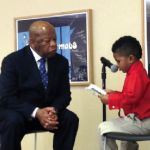 After former president of South Africa Nelson Mandela died last December, world leaders mourned the loss of a champion for Civil Rights.
After former president of South Africa Nelson Mandela died last December, world leaders mourned the loss of a champion for Civil Rights.
Several United States Congress members made the trip to Africa, including Ill.’s Aaron Schock ’02 and John Lewis from Georgia’s 5th district.
Lewis told Schock he had met Mandela before. Upon the meeting, Lewis expressed what an inspiration Mandela was through his fight for Civil Rights in South Africa.
But when Lewis was done speaking, all Mandela said back was “No sir, it is you who inspired me,” and he pulled out a book Lewis wrote and asked for his autograph.
“I couldn’t believe I was sitting next to the man [Lewis] who provided that inspiration to thousands of people,” Schock said.
This was just one of many stories sharing the insight, character and personality of Lewis, who presented as the keynote speaker April 11 at the Celebration of the Historic 1964 Civil Rights Act.
The event, sponsored by the Institute for Principled Leadership and Public Service and The Dirksen Congressional Center, brought together several politicians to pay tribute to U.S. Senate Minority Leader Everett Dirksen and his crusade for equality of all races.
“[Dirksen] was the single key for legislative success when the [Civil Rights bill of 1964] reached the Senate,” said Frank Mackaman of the Dirksen Center. “In the end, passing the Civil Rights bill was a moral imperative.”
Dirksen, a Pekin native who was a senator in the 1960s, was a major player in pushing for equal rights. Under his tenure, he introduced more than 140 bills to prevent laws of discrimination, Mackaman said.
While Dirksen was fighting for Civil Rights in Congress, Lewis was peacefully protesting in the streets. As the youngest member of the “Big Six” at the age of 21, Lewis worked alongside Martin Luther King, Jr. in the mission to create equality.
“In the Civil Rights movement I learned you can never, ever give up on anybody,” Lewis said. “You have to respect the dignity of every human being. That’s what [Abraham] Lincoln said. That’s what Dirksen said.”
Growing up in Alabama, Lewis said he faced discrimination on a daily basis. By the time he became close to King, he participated in sit-ins, marches and peaceful protests.
The group was faced with opposition, and Lewis said he was often spit on and beaten. He almost died in a Greyhound station while preparing for a freedom ride. In February 1960, he was arrested for the first of many times.
“The first time I was arrested, I felt free. I felt liberated,” he said. “My parents didn’t want me to get in trouble, but Martin Luther King, Jr. inspired me. If you see something that’s not right, not just, not fair, you have to speak up and unite others to bring change.”
Eventually, through Dirksen’s efforts in Congress, the Civil Rights Act of 1964 was passed. Since its passage, Lewis has worked with community organizations before he was elected into the House of Representatives in 1987.
“The act of 1964 created a new climate,” he said. “I wouldn’t be in Congress without it.”
Even though the Civil Rights Act was passed more than a half century ago, Lewis said we can carry out those ideals today.
“The way of peace, the way of love and non-violence, that’s what the movement taught all of us,” Lewis said. “As we celebrate the anniversary of the act, we must never give up, we must never give in or become bitter or hostile. We must find a way to respect every human being, and to love every human being.”







